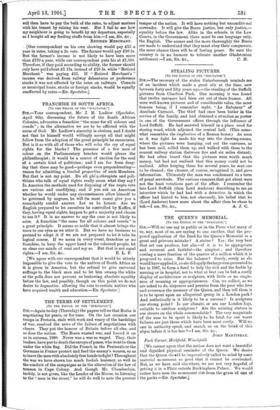FRANCHISE IN SOUTH AFRICA.
[To THE EDITOR OF THE "SPECTATOR.") Sim,—Your correspondent, Mr. J. M. Ludlow (Spectator, April 6th), discussing the future of the South African Colonies, advocates a franchise "the same for all colours and creeds" ; in the alternative we are to be afflicted with the curse of God. Mr. Ludlow's sincerity is obvious, and I doubt not that be himself would willingly accept all that might follow from the adoption of the great principle he enunciates. But is it so with all of those who will echo the cry of equal rights for the blacks ? The presence of a few men of dolour on the Parliamentary benches would please the philanthropist; it would be a source of unction for the soul of a certain kind of politician; and I am far from deny- ing that there may be good—perhaps even preponderating— reason for admitting a limited proportion of such Members. But that is not my point. Do all philaathropists and poli- ticians who talk of equal rights really mean what they say? in America the methods used for disposing of the negro vote are various and unedifying; and if you ask an American whether he would under any circumstances allow himself to be governed by negroes, he will (in most cases) give you a remarkably candid answer. Let us be holiest. Are we English prepared to let ourselves be controlled by Kaffirs, if they, having equal rights, happen to get a majority and choose to use it? It is no answer to say the case is not likely to arise. A franchise "the same for all colours and creeds" is a great principle. It seems so noble that it almost brings the tears to our eyes as we utter it. But we have no business to pretend to adopt it if we are not prepared to let it take its logical course. If we mean in every event, franchise or no franchise, to keep the upper hand on the coloured people, let vs clear our minds of cant and say so. But that is not equal [We agree with our correspondent that it would be utterly impossible to give the vote to the natives of South Africa as it is given in America, but the refusal to give universal suffrage to the black man and to let him swamp the white at the polls does not prevent us bestowing absolute equality before the law, and possibly, though on this point we do not desire to dogmatise, allowing the vote to certain natives who have acquired wealth and education.—En. Spectator.]






































 Previous page
Previous page